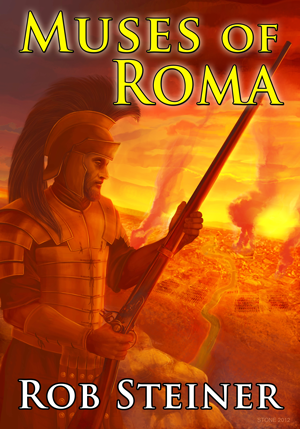 Worldbuilding is the process of creating a novel’s exotic setting — its history, geography, cultures, religions, etc. For the purposes of this post, I’m referring to made-up worlds in science-fiction and fantasy novels.
Worldbuilding is the process of creating a novel’s exotic setting — its history, geography, cultures, religions, etc. For the purposes of this post, I’m referring to made-up worlds in science-fiction and fantasy novels.
So which is better to create first: the world or the story? Well it’s different for every writer and every story.
For me, it started with the world.
A Strange Old World
“What if the Roman Empire had interstellar travel?” That was the germ of the idea that became MUSES OF ROMA. I wrote down most of my ideas in long brainstorming sessions–and created a 50-page encyclopedia–before I ever decided on a particular story or set of characters. So in my case, the worldbuilding came first, and then the story.
Except that’s not exactly accurate.
World Inspires Story
I did a lot of brainstorming on where we are, but not so much on how we got there. How did the Romans establish interstellar colonies? What was the one event in Roman history that diverged from our timeline and enabled such an outlandish, science-fictional situation to occur? I wanted that “terrifying secret” to be the core of my novel.
That’s when my story began building my world. I updated some of my initial worldbuilding so that my universe conformed to the event that changed Roman history. I abandoned most of my brainstorming because my story was more important than adhering to my original encyclopedia.
Story Builds World
Once I settled on the “terrifying secret” my heroes had to discover, I began adding more nooks and crannies to my world that I had not thought of during my initial brainstorming. What were the implications of this secret? How would real people–specifically ancient Romans–accept it, and then how would their culture evolve because of it?
Even while writing the first draft, when I thought I had all the big questions answered, the story forced me to ask more and more questions, which only added to the richness of the MUSES universe. At that point, the story was in firm control of my worldbuilding.
The Third Degree
Whether you build your world and then write your story, or vice versa, always ask, “How?” Every bit of history, culture, religion, etc., has to be a logical progression of what came before it. This is what I call giving my world the Third Degree–I must be able to answer the how at least three questions deep before a piece of worldbuilding goes into my novel.
For example, the Romans in my universe have interstellar colonies, so my Degree questions would go:
First Degree: How do they travel to those colonies?
Answer: They use wormholes that they call “waylines.”
Second Degree: How did they discover the “waylines?”
Answer: The gods told them.
Third Degree: How did the gods tell them?
Answer: The gods talk to the priests and College of Pontiffs, who relay the information to the people.
Leave the questioning to three degrees unless more questions/answers will impact the story; otherwise, if you’re like me, you’ll end up with a 50-page encyclopedia loaded with info you’ll never use!
I once read a fantasy novel where the heroes encountered a group of nomads “famous for their winemaking.” But the author never explained how these nomads made their wine. I was left to wonder if the nomads stored their vineyards and fermentation barrels in their horse-drawn wagons. 😉
So the author’s winemaking nomads failed the First Degree of questioning–how do nomads make wine? If he had asked at least that question, he would have noticed the problem and solved it by offering a plausible explanation for the nomads’ winemaking fame (or would’ve removed the reference altogether).
Step Away from the Encyclopedia
It’s very tempting to lose yourself in worldbuilding and research (“Hello, my name is Rob, and I’m a chronic worldbuilder….”), especially when it’s a topic you love. Remember that the story is the most important thing–build your world until it passes that Third Degree of questioning. After that, let it go and move on.